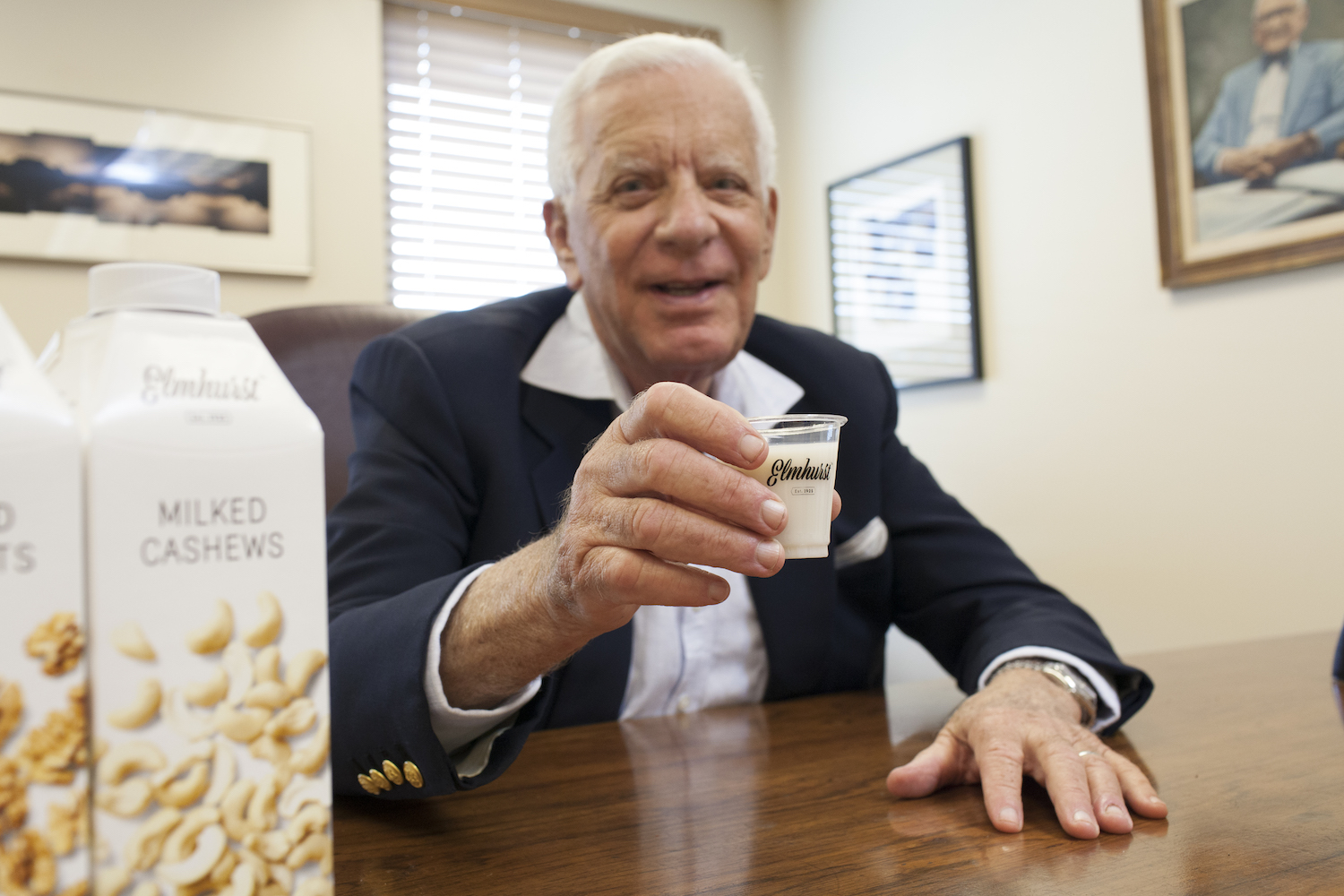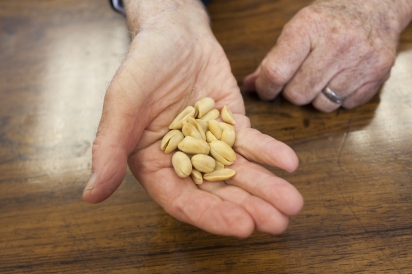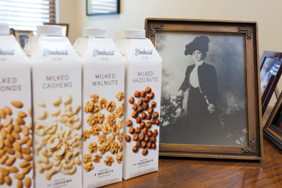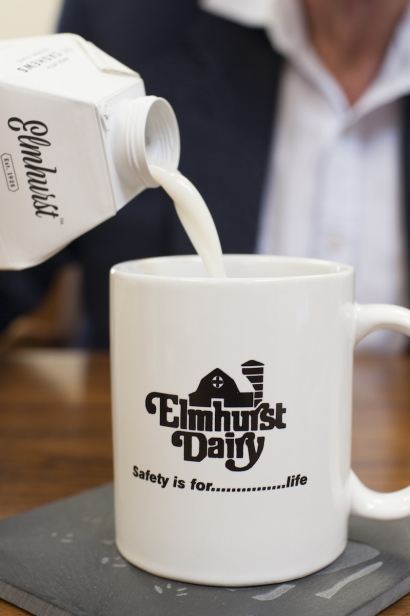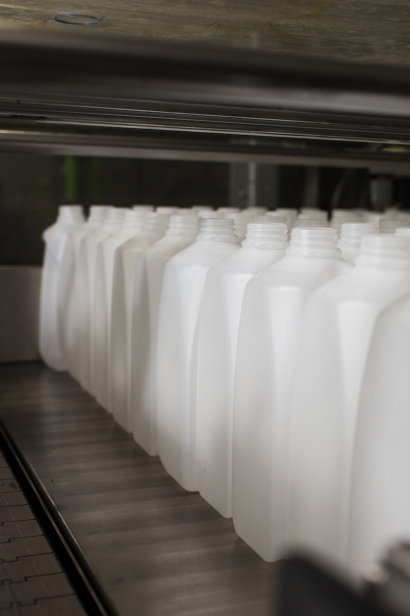Milking It
Gone is the iconic rainbow of sprightly red, orange, green and blue cartons of milk from bodega refrigerators across New York, where Elmhurst Dairy vended its Queens-based milk for nearly 100 years. October 2016 marked the first time since the island of Manhattan was called New Amsterdam that New York City didn’t have its own local milk producer. Elmhurst Dairy shut down its no-longer-profitable Jamaica based business and fated New Yorkers to a potential lifetime of milk sourced beyond the boundaries of the boroughs. However, just a year later, sleek white skyscraper-shaped cartons, as svelte as the Empire State Building, are destined to replace the missing local milk—but this time with nut-based beverages, a fastidious graphically designed reincarnation of the beloved local brand, now called Elmhurst Milked.
Declining dairy sales nationwide and a belief that plant-based foods are the future (a 2016 Nielsen study shows that almond milk sales increased 250% over the past five years) led 83-year-old Elmhurst heir and CEO Henry Schwartz to shut down his family’s business after almost a century. He updated the company from a 20th-century business to one embracing the future by creating a product on the brink of brand-new technology.
“In the years leading up to Elmhurst Dairy’s closure, I became a big personal supporter of plant-based diets for health and environmental reasons,” Schwartz said. “I began to see how plant-based foods like Elmhurst Milked can be so wonderfully effective at delivering wholefood nutrition from primary sources likes nuts, seeds and grains. After closing Elmhurst Dairy, I wanted to prove that non-dairy beverages can be just as nutritious and wholesome as dairy milk, and can taste great without containing any of the gums, stabilizers or emulsifiers typical of so many leading plant-based beverage brands.”
Elmhurst Milked enrolled Dr. Cheryl Mitchell, a scientific leader in the non-dairy milk industry for the past 35 years, to utilize her innovative resources to create a new product unlike any other nut milk on the market. Ready to develop nut milks that tasted like, well, milk, Empty bottles remain on the old production line, a vestige of Elmhurst’s past. The nut milks are now processed and bottled upstate in Elma, although the company’s offices are still in the old dairy in Jamaica.
Mitchell packed her bags and left California for New York, where she quite literally milks nuts with state-of-the-art technology, pretty much unseen on the beverage market before.
“Because of Elmhurst’s innovation in packaging and my innovation in ingredient development, it was a perfect match and perfect time for us to get together,” Mitchell said of her motivation to take on this new project, excited that a lifetime dairy veteran like Schwartz had “his heart set on non-dairy milks.”
What we currently think of as nut milk, especially almond milk, is “technically water with almond flavor,” Mitchell said. Nut milks currently available to consumers are typically made through a process that extracts the natural protein and fiber from the nuts, soaks the nuts and strains the pulp and adds stabilizers to create a milkiness that make the nut milk a passable substitute for creamy dairy. Anyone who has ever made almond milk at home has replicated this cold milling process, similar to the way a cold brew coffee or tea removes all of the actual ingredient and just reserves the liquid for flavor. Mitchell calls conventional almond milk “a big deceit … a successful product with no nutritional quality.”
The emulsion, or milking, process Mitchell developed for Elmhurst is an innovation many years in the making, yet revolutionary in the non-dairy realm. “I don’t think anything we’ve been doing for the last 2,000 years has been focused on maximizing the nutritional value [of nuts] or creating a milk or emulsion that looks like a milk and has the nutritional value of these ingredients,” Mitchell said.
At the plant upstate in Elma, Mitchell has replicated her process for extracting milk from almonds with walnuts, cashews and hazelnuts, maintaining the proteins and healthy fats (which eliminate the need for any stabilizers or gums) from the nuts themselves. Mitchell is also excited about developing a peanut milk, to debut in 2018, as peanuts are the most common American-grown nut and will help keep Elmhurst sustainable.
Keeping it local is important to the nearly centurion brand. “Queens is one of the most demographically diverse neighborhoods in the world, and in a sense this influenced us as we developed our Elmhurst Milked nut milks,” said Ken Voelker, marketing director at Elmhurst Milked.
While Elmhurst’s processing facility is now upstate in Elma, Elmhurst Milk’s offices are still in Jamaica, and a direct-to-consumer online shop allows customers from across America to order the nut milks. The brand has also targeted Williamsburg and downtown Brooklyn (prime almond milk latte–drinking candidates) for its initial distribution campaign. “It is important to us that we build and maintain a presence in our home city, and we look forward to working with local Queens grocery stores, cafés and restaurants within the coming months,” Voelker said. He sees everyone from health and wellness buffs to environmentally minded consumers to “adventurous home cooks to regular dairy drinkers who are interested in trying something new” using Elmhurst’s line of nut milks.
And with such a broad customer base, the team in Queens and upstate sees a nut milk revolution spurring from New York’s last and legendary family-owned dairy.
“Our goal is to lead the plant-based revolution and guide consumers towards products that are healthy for both people and the planet,” Schwartz said. “We hope to show consumers that plant-based beverages derived from primary, whole-food sources like raw nuts and seeds are powerfully nutritious when produced with the appropriate technology and they can be just as delicious as traditional dairy beverages.”


